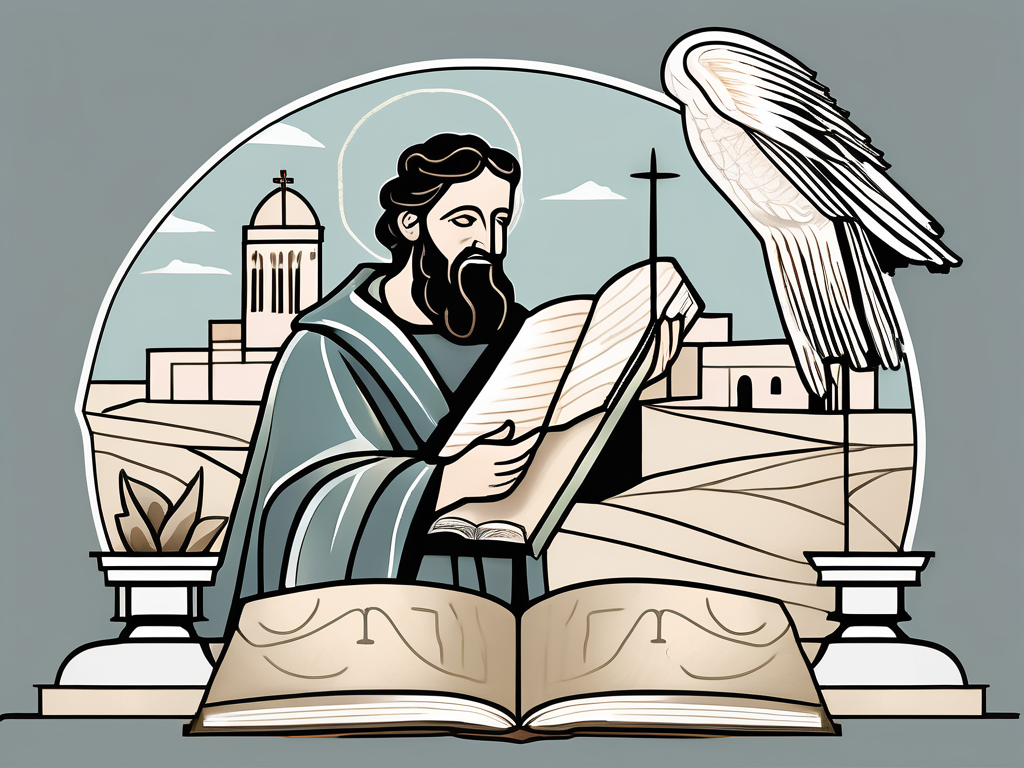Saint Luke the Evangelist holds a special place in Christian history, known for his remarkable contributions to the early church. Let’s delve deeper into his life and explore the enduring legacy he left behind.
Understanding Saint Luke’s Early Life
Before diving into his journey as an evangelist, it’s essential to gain insights into Saint Luke’s formative years. Through his upbringing and education, we can uncover the influences that shaped his character and faith.
Birth and Family Background
Saint Luke, whose full name is believed to be Luke the Physician, was likely born in the early first century AD in the city of Antioch, located in present-day Turkey. He hailed from a Greek-speaking family, which later played a significant role in his ministry and writing.
Antioch, a bustling metropolis known for its diverse population and rich cultural heritage, provided a vibrant backdrop for Luke’s early life. Growing up in such a cosmopolitan city exposed him to a wide range of ideas, beliefs, and traditions, which would later shape his understanding of the world and his approach to spreading the Gospel.
Education and Early Influences
As a meticulous chronicler, Saint Luke’s attention to detail captures the essence of his well-rounded education. He was not only well-versed in Greek literature and philosophy, but also had a deep understanding of the Jewish traditions and scriptures. This unique blend of knowledge allowed him to bridge the gap between different cultures and effectively communicate the message of Christianity.
During his formative years, Luke had the privilege of studying under renowned scholars and philosophers of his time. The intellectual environment of Antioch provided him with ample opportunities to engage in stimulating discussions and debates, further sharpening his intellect and expanding his worldview.
Furthermore, it is widely believed that Saint Luke’s exposure to Hellenistic culture greatly influenced his perspectives and style of writing, ultimately setting him apart from the other Gospel writers. The Hellenistic period, characterized by the fusion of Greek and Eastern cultures, left an indelible mark on Luke’s thought process and writing style. His Gospel reflects a unique blend of Greek rhetorical techniques and Jewish narrative traditions, making it a compelling and captivating account of the life and teachings of Jesus.
As Luke embarked on his journey as an evangelist, his diverse upbringing and extensive education served as a solid foundation for his mission. His ability to connect with people from different backgrounds and his deep understanding of various cultural nuances allowed him to effectively communicate the message of salvation to a wide audience.
Saint Luke’s Journey to Evangelism
While Saint Luke’s early life was intriguing, his conversion to Christianity and subsequent association with Saint Paul catapulted him onto an extraordinary path as an evangelist.
But what led Saint Luke to embrace Christianity so fervently? It was a transformative earthquake that shook the very foundations of his existence. In the depths of his soul, he felt a profound calling, a divine invitation to follow the teachings of Jesus Christ. With a heart full of faith, he took the leap, surrendering himself completely to the path of righteousness.
From that moment on, Saint Luke’s life was forever changed. He became a beacon of hope, a vessel through which the light of the Gospel could shine brightly. His conversion was not just a personal journey; it was a mission to bring salvation to all who would listen.
With unwavering commitment and deep conviction, Saint Luke emerged as a steadfast advocate for the Christian faith. He tirelessly traveled far and wide, sharing the Good News with anyone who would lend an ear. His words were imbued with a profound sense of love and compassion, drawing people from all walks of life to the message of salvation.
Association with Saint Paul
But it was Saint Luke’s association with Saint Paul that truly set his ministry ablaze. Their paths converged, and together they embarked on a remarkable journey, united by a shared purpose and a burning desire to expand the Christian faith.
As Saint Luke traveled alongside Saint Paul, he witnessed firsthand the miracles and wonders that unfolded before their eyes. He saw lives transformed, hearts healed, and communities united under the banner of Christ’s love. And he meticulously documented every step of their extraordinary odyssey, ensuring that the remarkable events of the early church would be preserved for future generations.
The bond between Saint Luke and Saint Paul was unbreakable. They were not just companions on a physical journey; they were kindred spirits, their souls intertwined in a divine dance. Together, they faced persecution, hardship, and opposition, but their unwavering faith propelled them forward, undeterred by the challenges that lay ahead.
Through their shared endeavors, Saint Luke and Saint Paul left an indelible mark on the history of Christianity. Their legacy continues to inspire countless believers, reminding them of the power of faith, the importance of spreading the Gospel, and the transformative nature of God’s love.
The Gospel According to Luke
Now, let’s explore Saint Luke’s most significant literary contribution, the Gospel that bears his name. This Gospel offers unique perspectives on the life and ministry of Jesus Christ, making it a cherished part of the New Testament.
Saint Luke, also known as Luke the Evangelist, was a companion of the apostle Paul and a physician by profession. His Gospel stands out among the four canonical Gospels for its meticulous attention to detail and its profound insights into the teachings and actions of Jesus.
One distinctive feature of Luke’s Gospel lies in his meticulous attention to detail. His account includes numerous narratives and parables that reveal Jesus’ compassion for the marginalized and oppressed, emphasizing his mission to bring salvation to all.
For instance, Luke includes the famous parables of the Good Samaritan and the Prodigal Son, which highlight the importance of compassion, forgiveness, and reconciliation. These stories serve as powerful reminders of God’s boundless love and mercy.
Furthermore, Saint Luke’s Gospel offers a vivid portrayal of salvation history and the all-encompassing love of God, which resonated deeply with both Jewish and Gentile audiences. Luke traces Jesus’ genealogy all the way back to Adam, emphasizing the universal scope of God’s redemptive plan.
In addition to his attention to detail, Luke also emphasizes the role of women in Jesus’ ministry. He includes stories of women such as Mary, the mother of Jesus, and Mary Magdalene, who played significant roles in the life and ministry of Jesus. This emphasis on women challenges the social norms of the time and highlights the inclusive nature of Jesus’ message.
As a skilled writer, Saint Luke employed various theological themes throughout his Gospel. The emphasis on mercy, forgiveness, and the role of women in Jesus’ ministry uplifted marginalized voices and challenged social norms of the time.
Moreover, Luke’s Gospel underscores the significance of prayer, the Holy Spirit’s guidance, and the transformative power of faith in daily life. Luke portrays Jesus as a prayerful individual who frequently withdraws to solitary places to commune with God. He also highlights the role of the Holy Spirit in Jesus’ life and ministry, emphasizing the importance of seeking divine guidance in our own lives.
Overall, the Gospel according to Luke offers a rich and comprehensive account of Jesus’ life, teachings, and mission. It presents a compelling narrative that invites readers to reflect on the profound love and mercy of God and to embrace the transformative power of faith.
Saint Luke’s Contributions to the Acts of the Apostles
Beyond his Gospel, Saint Luke played an instrumental role in chronicling the early years of the church through his authorship of the Acts of the Apostles. This historical account reveals key events and sheds light on the formation and growth of early Christian communities.
Luke’s Role in the Early Church
Saint Luke’s commitment to ensuring accurate historical documentation makes his contribution invaluable. His writings provide a bridge between the life and teachings of Jesus Christ and the establishment of the early church, serving as a guide for future generations of believers.
Key Events Documented by Luke
The Acts of the Apostles serves as a captivating narrative, detailing the outpouring of the Holy Spirit on the day of Pentecost, the spread of Christianity throughout the Roman Empire, and the trials and triumphs faced by the early disciples.
These accounts, intertwined with Saint Luke’s firsthand experiences, offer profound insights into the challenges and resilience of the early church, inspiring generations of believers to navigate their spiritual journeys with courage and perseverance.
The Legacy of Saint Luke
Saint Luke’s impact extends far beyond his role as an evangelist and writer. His legacy has touched numerous aspects of Christian culture, leaving an indelible mark on history.
Saint Luke’s Influence on Christian Art
Throughout the centuries, Saint Luke has been revered as the patron saint of artists and painters. His association with the arts stems from the belief that he painted the first icon of the Virgin Mary, which became an object of veneration and a source of inspiration for artists worldwide.
Saint Luke’s Impact on Modern Christianity
Today, the life and writings of Saint Luke continue to impact Christians worldwide. His emphasis on compassion, inclusivity, and the transformative power of faith resonates deeply with believers seeking to live out the Gospel message in their daily lives.
Furthermore, Saint Luke’s commitment to meticulous documentation serves as a reminder of the importance of safeguarding and sharing the remarkable story of Jesus Christ and the early church for future generations.
In Conclusion
Saint Luke the Evangelist lived a remarkable life of faith and service. His journey from conversion to becoming one of the most influential writers of the New Testament highlights the transformative power of encountering Jesus Christ.
Through his unique perspectives, meticulous documentation, and enduring legacy, Saint Luke’s life continues to inspire believers to embrace an unwavering commitment to their faith, serving as a beacon of hope and a reminder of God’s abundant love.












